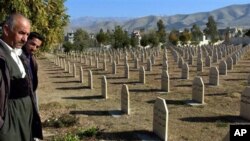The chemical attack on Halabja by Iraqi forces took place 24 years ago today. The attack was the height of Iraqi leader Saddam Hussein’s al-Anfal operation, a genocidal campaign against the Kurds and other ethnic groups in Northern Iraq.
Early on the evening of March 16, 1988, the attacks by Iraqi government forces against the city of Halabja suddenly changed. For two days, the city of some 50 thousand, most of them Kurdish civilians, had been subjected to rocket attacks. But then, attacking aircraft began to pepper the city with canisters of chemical weapons including mustard gas and the nerve agents sarin, tabun, and VX.
That day, some 5,000 people died within minutes. Another 7,000 were injured, crippled, or suffered long-term health problems.
Between 1986 and 1989, in order to rid the country of a troublesome population, Saddam Hussein ordered the Iraqi armed forces to turn their weapons against their fellow citizens. Under the leadership of the dictator’s cousin, Ali Hassan al-Majid, the Iraqi army systematically destroyed villages, incarcerated in concentration camps, starved, and executed thousands of people.
Nor was Halabja the only town subjected to a chemical weapons attack. Early in 1987, Saddam Hussein authorized the use of chemical weapons in attacks on as many as 24 Kurdish villages. For his role in these heinous attacks, al-Majid earned the nickname Chemical Ali.
Al-Anfal was a series of horrific crimes perpetrated against a civilian population by orders of the leadership of their native country, and the gassing of the population of Halabja was that campaign’s worst atrocity.
For his part in it, and other crimes, Chemical Ali was executed by hanging. Saddam Hussein, too, was tried for numerous crimes, including crimes perpetrated by his orders against the Iraqi people. He too was hanged.
The head of government has a responsibility to its country, and to its people, to act in their best interest. Ultimately, few dictators die in bed, or exit the scene of their crimes gracefully. The fate of the instigator of al-Anfal and the killer of Halabja serves as a warning to others who follow in their murderous footsteps.




